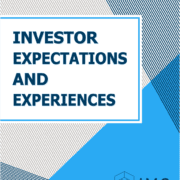3 Ways Real Estate Investors Can Prepare for a Recession
Today, approximately 58% of investors believe that a recession will occur in 2020, creating some uncertainty amongst investors across all industries, including commercial real estate. When investing in real estate, it is understood that the market is cyclical and therefore has the potential for an investment to go awry. Fortunately, although recessions often emerge swiftly, they do not typically appear without first presenting warning signs that a potential downturn is on the horizon, such as shifts in consumer confidence, a decline in employment rates, and a plummeting stock market. For real estate investors, being aware of these changes and taking the necessary precautions to prepare in the event of a recession can be a defining moment for their portfolios’ performance before, during, and after an economic downturn.
Read ahead to learn how real estate investors can prepare for a potential recession and ensure that their portfolio performance remains stable during times of uncertainty.
1.) Diversifying Their Portfolios
While portfolio diversification is a critical factor for investors to consider when making investment decisions while the economy is strong, it becomes even more important when the threat of a recession is lingering. Diversification is key because if one deal underperforms, the entire portfolio will not suffer along with it. In preparation for a recession, investors should consider how exposed their portfolio is to different types of investments and assets. For instance, does the portfolio include only one asset type, such as offices or multifamily? Or do the investments only reflect an opportunistic risk profile? If the answer to questions like these is yes, there is an increased likelihood that an investor will more heavily experience the negative impacts of an economic slump than those whose deals are spread across different forms of investments, industries, geographic locations, and companies of various sizes.
2.) Partnering with Firms Who Leverage Updated Technology
Technology is taking the real estate industry by storm and has been rapidly evolving over the last few years. Now, more than ever before, investors are demanding frequent engagement, regular communications, easy access to their data, and transparency about their investments from the sponsors and firms with whom they invest. During times of economic uncertainty, investors’ desires for consistent communications and on-demand 24/7 access to their existing investment deals will only increase.
By partnering with firms who have both adopted and implemented real estate technology and are successfully leveraging a global platform, like RealPage IMS, investors can efficiently monitor their investments while managing risks and identifying opportunities to maximize returns despite the market’s potential slowdown. Additionally, tech platforms and tools increase market intelligence, allowing investors to view both historical records and current conditions so that they can make better, more informed decisions – an advantage that is extremely important in an already unpredictable, volatile market that could potentially be impacted by the added pressures of a recession.
3.) Considering Emerging Opportunities Post-Recession
With the word “downturn” buzzing throughout the nation, focusing on the negative outcomes and possibilities easily becomes the norm. Amidst the fear of losing money and seeing a less significant return on investment, many investors get spooked and start responding to fewer opportunities and may even begin backing out of current deals. While this is an easy default mode, planning ahead and considering emerging opportunities post-recession is one way that investors can ensure that, no matter the outcome, they are ready to hit the ground running when the economy makes its comeback. With the historical evidence that investors who keep their investments through recessions are more likely to see their portfolios completely recover and individuals who do not invest in the market altogether during this time lose out, considering investments positioned for long-term growth after the economy recovers is another way to prepare and plan ahead.
As the market continues to shift and growing skepticism surrounding the global economy looms, proactive real estate investors need to begin preparing for the “what if” scenario. For those who are aiming to get one step ahead so that they are less forcefully impacted by the slowdown, effective preparation is key.
You may also be interested in When CRE Investors Get Cold Feet: How to Provide Reassurance and Regain Trust.











